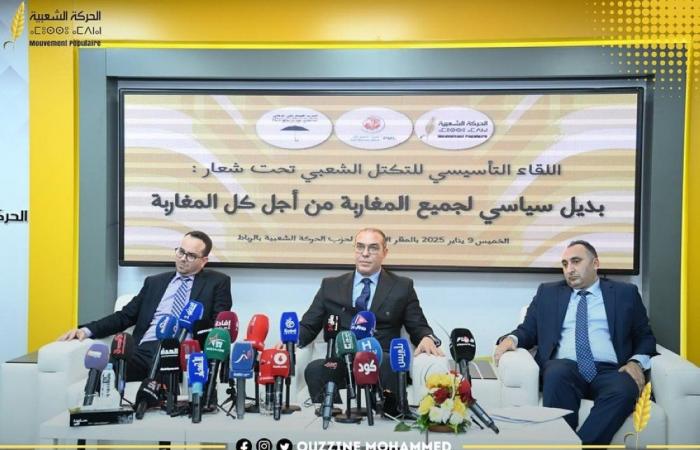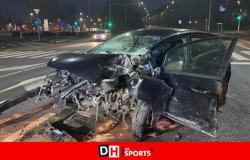In a Moroccan political landscape accustomed to splits and divisions, the initiative launched by three political parties was unexpected to say the least. THE Popular movementthe Moroccan Liberal Party and the National Democratic Party decided to come together to create the “Popular Coalition“. According to the leaders of these parties, this grouping cannot be reduced to a simple electoral alliance. Their ambition? Thoroughly overhaul political practice in Morocco, to better meet the expectations of citizens and confront the many challenges facing the country. A promise that raises as many hopes as questions. A look behind the scenes of this initiative presented by its initiators as being “out of the ordinary”.
A founding act to reinvent Moroccan politics
It was in an atmosphere that was both solemn and enthusiastic – despite some organizational screw-ups – that the signing ceremony of the founding platform of the Popular Coalition took place on January 9. In front of a large audience bringing together activists, sympathizers, journalists and observers, the general secretaries of the three parties behind the project – Mohamed Ouzzine for the MP, Khalid Bakkali for the PND and Isaac Charia for the PML – took turns speech to explain the philosophy and the main points.
“We are gathered today to take a founding act, thanks to which we hope to contribute to putting Moroccan politics back on the rails of progress and democracy,” declared Mr. Ouzzine at the opening of his speech. He underlined the desire of the founding parties to “go beyond artificial divisions and partisan quarrels to concentrate on the essential: the superior interest of the nation and the well-being of citizens”.
For his part, Khalid Bakkali insisted on the historical dimension of the event: “This coalition is part of the continuity of the fights led by progressive forces since independence to advance democracy and human rights in our country. Today, we are taking a new step by proposing an unprecedented framework for political action, based on dialogue, openness and the search for concrete solutions to Moroccans’ problems.
Isaac Charia, for his part, emphasized the urgency of acting in the face of the deterioration of the political and social situation: “Our country is going through a deep crisis, which is manifested by a loss of confidence of citizens in political actors. . Regressive trends threaten democratic achievements and the values that underpin our identity. Faced with these dangers, it is our duty to react by creating a credible and hopeful alternative.”
13 “ambitious” objectives to transform Morocco
At the heart of the Popular Coalition project is a 13-point platform, a real roadmap for political, economic and social reform in the country. Among the major objectives are the consolidation of the rule of law and democratic institutions, the promotion of social and territorial justice, the defense of Moroccan identity in its plurality, and the strengthening of Morocco’s place on the scene. international.
“Our ambition is to build a fairer, more united and more democratic Morocco, where every citizen can flourish and find their place,” summarized Mohamed Ouzzine. “This requires profound reforms affecting all areas, from education to health, including employment, the economy and even the environment. The 13 objectives that we have defined outline the contours of this new Morocco to which we aspire.
The platform particularly emphasizes the need to restore confidence in political action, by promoting a new generation of honest and competent elites. “Too often, politics has been synonymous with electoral calculations, clientelism and the race for positions. We want to change this image by bringing out exemplary leaders, driven by the sole concern of serving the general interest,” affirmed Khalid Bakkali.
Another central axis is the fight against territorial inequalities and social exclusion. “Our coalition wants to be the voice of the forgotten, of all those Moroccans who live in isolated areas, who struggle to access education and healthcare, who cannot find employment despite their efforts. One of our priorities will be to restore spatial justice and ensure the balanced development of all regions of the country,” promised Isaac Charia.
“An open coalition that listens to citizens”
During the launching ceremony, the leaders of the Popular Coalition were keen to emphasize that their initiative was not limited to the three founding parties, but was intended to bring together all the active forces of the nation around a common project. “We are launching an appeal to all political parties and movements, to all civil society organizations that share our values and our ambition for Morocco, so that they join us and enrich our project,” launched Mr. Ouzzine. Likewise, the founders of the coalition insisted on their desire to listen to citizens and to involve all components of Moroccan society in their reflection. “We do not want to be an above-ground coalition, disconnected from the realities and aspirations of Moroccans. On the contrary, our action will be permanently guided by feedback from the field, dialogue with local actors, consultation with the driving forces,” assured Mr. Bakkali.
To do this, the Popular Coalition intends to put in place a series of innovative mechanisms, as explained by Aaddi Sbaï, member of the MP political bureau: “We are going to create specialized commissions which will work on the application of our project to all levels, internally and externally.
Splits and reunions: the atypical journey of the Haraki current
The launch of the Popular Coalition comes in a Moroccan political context marked, since independence, by numerous splits and divisions within parties. This fragmentation has contributed to weakening the multiparty system, often reducing it to a “formal value” in the words of sociologist Mohammed El Ayadi. The Popular Movement (created in 1959), a historic player on the national political scene, was not spared by this phenomenon. It experienced a major split with the creation of the Democratic and Constitutional Popular Movement (in 1967) by Doctor Abdelkrim Khatib and the Popular National Movement (MNP in 1991) by Mahjoubi Aherdane. It took a decade and the 2001 congress for the MNP to truly structure itself as a party, only to experience, in the same year, another split giving birth to the Democratic Union (UD) led by Bouazza Ikken. However, aware of the deleterious effects of these divisions, the “Haraki” (Popular) current worked to overcome them and bring together political forces sharing the same values. Thus, in 2006, the Popular Movement, the MNP and the Democratic Union (UD) merged to give birth to a unified party: the ancestor party MP. As pointed out by M’hand Laenser, president of the MP, who recalls this merger of the three parties in 2006, during his inaugural speech of the Popular Coalition, was not limited to electoral objectives, but aimed to serve the interest general and to consolidate multipartyism and democracy in the country.






